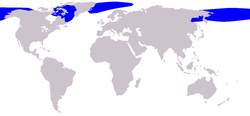Bowhead Whales
|
|
| Bowhead Whale Conservation status: Lower risk | ||||||||||||||||||
|---|---|---|---|---|---|---|---|---|---|---|---|---|---|---|---|---|---|---|
| Missing image Bowheads42.jpg Bowhead Whales | ||||||||||||||||||
| Scientific classification | ||||||||||||||||||
| ||||||||||||||||||
| Binomial name | ||||||||||||||||||
| Balaena mysticetus Linneus, 1758 | ||||||||||||||||||
 Bowhead Whale range |
The Bowhead Whale (Balaena mysticetus), also known as Greenland Right Whale or Arctic Whale, is a marine mammal of the order Cetacea.
| Contents |
Description
They are robust-bodied, dark-colored animals with no dorsal fin and a strongly bowed lower jaw and narrow upper jaw. The baleen plates of Bowhead Whales, which are used to strain tiny prey from the water, are the longest of any baleen whale, exceeding 3 meters. They have massively bony skulls which they use to break through the ice to breathe. Some Inuit hunters have reported whales surfacing through 2 feet (60 centimeters) of ice. Bowheads may reach lengths of up to 20 meters; females are larger than males. The blubber layer of the bowhead whale is thicker than in any other animal, averaging 43-50cm (17-20in).
Distribution
Bowhead Whales are the only baleen whales that spend their entire lives in and around Arctic waters. The Bowhead Whales found off Alaska spend the winter months in the southwestern Bering Sea. They migrate northward in the spring, following openings in the pack ice, into the Chukchi and Beaufort seas, hunting krill and zooplankton. Bowheads are slow swimmers and usually travel alone or in small herds of up to six animals. Although they may stay below the water surface for as long as forty minutes in a single dive, they are not thought to be deep divers.
Reproduction and Lifespan
Bowhead Whales are highly vocal and use underwater sounds to communicate while traveling, feeding, and socializing. Some Bowheads produce long repetitive songs that may be mating displays. They also breach, tail slap, and spy-hop. Sexual activity occurs between pairs and in boisterous groups of several males and one or two females.
Breeding has been observed from March through August; conception is believed to occur primarily in March. Reproduction can begin when a whale is 10 to 15 years old. Females produce a calf once every 3 to 4 years, after a 13 to 14 month pregnancy. The newborn calf is about 4.5 m long and approximately 1000 kg, growing to 9 m by its first birthday. The lifespan of a bowhead was once thought to be 60 to 70 years, similar to other whales. However, discoveries of antique ivory spearpoints in living whales in 1993, 1995 and 1999 have triggered further research based on structures in the whale's eye, leading to the reliable conclusion that at least some individuals have lived to be 150-200 years old (another report has said a female at the age of 90 was allegedly still reproductive). Bowhead Whales May Be the World's Oldest Mammals (http://www.gi.alaska.edu/ScienceForum/ASF15/1529.html)
Population Status
Bowhead Whales have been hunted for their blubber, meat, oil, bones and baleen. They are closely related to the right whale and share with it the hunting-friendly characteristics of slow swimming and floating after death. Before commercial whaling, there were over 50,000 Bowhead Whales in the north polar region (estimated). Commercial whaling starting in 1611 near Svalbard and Greenland and wiped out herds of the slow growing whales, then moved on to new areas. In the North Pacific, the commercial fishery began in the mid-1800s, and within two decades over 60 percent of the Bowhead Whale population had been killed.
Commercial whaling, the principal cause of the population decline, has been discontinued. The stock off Alaska has increased since commercial whaling ceased. Alaskan natives continue to take small numbers of bowhead whales in subsistence hunts each year. This level of harvest (25-40 animals annually) is not expected to affect the stock's recovery. The Bowhead Whale population of Alaska's coast appears to be recovering but remains at about 7,800 animals (1990), roughly 41 percent of the pre-whaling population. The status of the other bowhead stocks is less well known. These stocks are thought to be very small, probably in the low hundreds, for a possible worldwide population of 8,000-9,200 individuals.
The bowhead is one of the most seriously endangered of all the large whales, and is listed as such by CITES.
Range, behavior, and predators
The Bowhead spends all of its life in fertile Arctic waters, unlike other whales that migrate for feeding or reproduction. Bowheads are social and non-aggressive, and will retreat under the ice when threatened. Their predators are Orca and humans.
External links
- Bowhead Whale: Detailed Information from NOAA (http://nmml.afsc.noaa.gov/education/cetaceans/bowhead2.htm)
